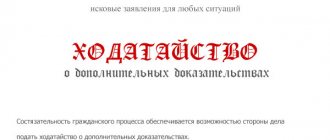During the proceedings, the outcome of the case depends on how sufficient and reliable information each party provided. However, there are often situations when it is difficult to obtain certain documents.
According to current legislation, if there is insufficient data, participants have the right to file a petition with the court at any stage to obtain evidence. In this case, the judge facilitates the receipt of relevant documentation if he considers it necessary to continue the proceedings and make a final decision.
How to make a petition to obtain evidence
Cases cannot be excluded when the justifications, claims or evidence of innocence provided to the court are not enough to make a final decision. In such situations, the law allows you to request additional information through the court.
You should send a petition to the court to obtain evidence if you are unable to independently obtain documents to support your position.
Such documentary evidence includes:
- medical examinations and reports;
- certificates of income, debt obligations;
- materials of the criminal case;
- information about administrative violations;
- registration of real estate;
- other documentation.
According to the Civil Procedure Code of the Russian Federation, it is allowed to demand audio and video recordings, written and electronic documents, and photographs.
In arbitration and other courts, the demand for evidence is allowed on any side of the criminal case. The main provisions on the procedure and basis for filing an application for reclaiming title documents are enshrined in the procedural codes:
- in cases of the arbitration court - Art. 66 Arbitration Procedure Code of the Russian Federation;
- for civil proceedings - Art. 57 Code of Civil Procedure of the Russian Federation;
- in an administrative case - Art. 63 CAS RF.
In the relevant petition, it is necessary to define the required document, justify the circumstances in which the relevant evidence will be required, clarify the reasons for the impossibility of obtaining information and its location.
The appeal must consist of the following blocks:
- Introductory part. The following information is indicated: full name, address, contact information of the applicant, the situation in the case is specified. The recipient is determined - the name of the court.
- Main part. The circumstances in which additional evidence is required are explained. List the essence of the document, legally significant circumstances for the case, reasons for the difficulty of obtaining information and locations.
- Resolution. A request to request information from a specified citizen, official or authorized body is directly described.
- Application. The list of documents attached to the application is specified, in particular, confirming the impossibility of obtaining information.
- Conclusion. The date of sending the request, signature and initials of the applicant are entered.
The court has the right to refuse to request evidence only if it is not relevant to the case
In the Determination of September 3, 2021 No. 5-KG19-105, the Supreme Court came to the conclusion that refusal to assist in obtaining evidence is possible only in cases where the relevant evidence is not related to the civil case in which the proceedings are being conducted or is not relevant requirements of relevance and admissibility.
Minors Ekaterina, Grigory and Ivan Shchukin are the owners of the apartment. During the period from March 23 to April 10, 2021, a general meeting of premises owners was held in the building where it is located. The total number of votes of those who took part in the meeting amounted to just over 76% of the total number of votes of the owners. Moreover, when determining the quorum required to make decisions on each item on the agenda, the owners proceeded from the fact that 100% of the votes were not the votes of all owners, but the votes of those who took part in the meeting.
The father of minors, Igor Shchukin, in the interests of his children, filed a lawsuit to invalidate the decision of the general meeting. The defendant in the case was one of the initiators of the meeting, Marianne Bentchen.
Igor Shchukin indicated that in accordance with paragraph 1 of Art. 46 of the Housing Code, decisions on issues specified in the agenda must be made by a majority of at least two-thirds of the total number of votes of the owners of premises in an apartment building, and not of the total number of voters. Therefore, according to the plaintiff, the decisions of the general meeting that he challenged were adopted in the absence of a quorum. The plaintiff also referred to the fact that the protocol does not contain information about the area of premises owned by persons who voted positively. Additionally, Igor Shchukin drew the court's attention to the fact that copies of the decisions and minutes of the general meeting were not promptly submitted to the state housing supervision body (Moszhilinspektsiya). This, the plaintiff believes, indicates a violation of the vote counting procedure.
In a decision dated May 15, 2021 in case No. 02-0635/2018 (02-5580/2017), the Golovinsky District Court of Moscow agreed with the stated requirements. Subsequently, this act was upheld by the Moscow City Court (appeal ruling dated November 8, 2021 in case No. 33-49444/2018).
In deciding to satisfy the claims, the court of first instance proceeded from the fact that the defendant did not prove the presence of a quorum when decisions were made by the general meeting of owners. The district court also indicated that it itself “has not obtained the relevant evidence.” At the same time, the first instance noted that the minutes of the general meeting in itself are not a document on the basis of which the number of persons present at the meeting can be established, since such information is entered into the minutes on the basis of other documents according to which the votes participating in the meeting are counted.
When considering the dispute in cassation, the Supreme Court discovered significant violations of procedural law committed by lower authorities, which influenced the outcome of the case.
The Collegium for Civil Cases indicated that, within the meaning of paragraph 1 of Art. 181.3 and paragraph 2 of Art. 181.5 of the Civil Code in this case, the burden of proving the presence of the necessary quorum rests with the defendant. The court of first instance, in the opinion of the Supreme Court, correctly distributed the burden of proof and made the right decision to assist the defendant in requesting evidence of the presence of a quorum at the general meeting from the Moscow Housing Inspectorate.
Having analyzed the case materials, the Supreme Court found that the Moscow Housing Inspectorate, at the request of the court, provided copies of the minutes of the general meetings held in the apartment building, and a response that denied the fact that the housing supervision body had received the minutes of the contested general meeting. Since the Moscow Housing Inspectorate did not submit to the court all the documents requested from it, including the decisions of the owners, the defendant again asked the court to assist in requesting evidence of a quorum, since he himself could not obtain them. However, both authorities rejected the request.
The highest court reminded that Part 1 of Art. 57 of the Code of Civil Procedure of the Russian Federation gives the court the authority to assist in collecting and requesting evidence if it is difficult for these persons to provide the necessary evidence. According to the Judicial Collegium, refusal to assist in obtaining evidence is possible only in cases where the relevant evidence is not related to the civil case in which the proceedings are being conducted or does not meet the requirements of relevance and admissibility.
The Supreme Court emphasized that, by allowing a petition to obtain and examine evidence, the court uses the powers that it has in the judicial stages of civil proceedings and that the parties do not have. “By refusing to resolve the request for evidence that is of fundamental importance for resolving the dispute and resolving the dispute on the merits, the court of first instance thereby created unequal conditions for the defendant’s side, effectively depriving the defendant’s side of the opportunity to present evidence refuting the plaintiff’s arguments,” the ruling says. .
The College of Civil Cases noted that in accordance with Part 1 of Art. 46 of the Housing Code, in force at the time of the decision of the general meeting, copies of decisions and minutes of the general meeting of owners of premises in an apartment building are subject to mandatory submission by the person on whose initiative the general meeting was convened to the management organization and the board of the HOA no later than 10 days after the general meeting meetings of owners of premises in an apartment building. After this, the management company and the board of the HOA are required to send copies of these decisions and protocols to the state housing supervision authority for storage for 3 years.
The Supreme Court indicated that the defendant reported the proper fulfillment of her obligation to submit copies of decisions and minutes of the general meeting to the management organization, which, in turn, sent copies of these documents to the Moscow Housing Inspectorate. Moreover, as stated in the ruling, Marianne Bentchen presented to the appellate court documents confirming the fact that the Moscow Housing Inspectorate had received copies of the relevant documents.
However, the panel noted, the appellate court did not evaluate this evidence and, given the obvious lack of opportunity for the defendant to confirm his legal position in another way, refused to accept evidence confirming the presence of documents relating to the general meeting in the Moscow Housing Inspectorate.
The Supreme Court noted that the Moscow City Court also violated the explanations of paragraph 29 of the Plenum Resolution No. 13 of June 19, 2012 “On the application by courts of the norms of civil procedural legislation governing proceedings in the appellate court” and did not raise for discussion the issue of the need to additionally request from Moscow Housing Inspectorate documents relating to the contested general meeting.
Thus, the Court overturned the decisions of the lower authorities and sent the case for a new trial to the Moscow City Court.
Commenting on the decision of the Supreme Court, lawyer of the Moscow Administration Anna Minushkina said that courts often refuse to satisfy requests for evidence, despite the fact that the party justifies its position by the impossibility of providing it independently. “In my practice, there have been cases when the court, satisfying a request for evidence, made a decision without receiving a response to the judicial request, citing the timing of the consideration of the case and other circumstances,” explains the lawyer.
Anna Minushkina believes that the ruling of the Supreme Court under consideration will serve as an additional argument when a party substantiates the need to satisfy its petition to obtain evidence.
Lawyer of AK No. 22 “Civil Compensation” of the Nizhny Novgorod Regional Bar Association, Alexander Nemov, told AG that he had also repeatedly encountered the court’s refusal to expect a response to a previously sent judicial request. According to him, when justifying their position, the courts refer to the timing of the consideration of the case. “I share the position of the Supreme Court. Since the Court has decided that in order to consider the case it is necessary to obtain certain information, then until this information is received, if there is an objective possibility of obtaining it, the circumstances cannot be considered comprehensively studied by the court. I will definitely use this definition of the RF Supreme Court in my practice in the future and observe the actions of the judges,” the lawyer concluded.
Ilya Prokofiev, lawyer for MCA Centryurservice, noted that courts often make decisions without waiting for a response to a judicial request, when the consideration of the case, in the opinion of the judge, has already taken too long. “At the same time, court decisions made with such violations are upheld by appeal and cassation, considering these violations to be insignificant,” the lawyer said.
Ilya Prokofiev believes that the opinion of the Supreme Court, as set out in this ruling, should “once again remind the courts of the basic principles of legal proceedings and prevent the repetition of similar judicial errors.” The lawyer believes that this case should be included in the next review of the judicial practice of the Supreme Court.
Procedure for requesting evidence
There are several ways to submit an application for the need to submit documents:
- make a request orally during a meeting - the request is recorded in the minutes;
- send a request by email;
- provide in person through the court office;
- send a request on the “My Arbitrator” portal.
A request to obtain documents confirming the main position and claims of the persons involved in the case can be submitted at any stage of the legal process.
The only limitation is that filing a petition is allowed only before the final decision is made.
The standard procedure for requesting evidence is as follows:
- Sending a corresponding application to the judge.
- Consideration of the circumstances of the case taking into account the received petition.
- The court's decision to accept or reject the request.
If the decision is positive, the court issues a ruling on the collection of information. A copy of the document is sent to the citizen, official or authorized body at whose disposal the relevant information is located. Notice of the motion is also given to other participants in the proceeding.
The person from whom the documents are requested must provide a response to the court's request within five days from the date of receipt of the notification. If it is not possible to send the relevant information, you must provide a response indicating the reasons. The information is sent to the court or directly to the applicant.
Otherwise, a fine is imposed within the established limits:
- for citizens - up to 5,000 rubles;
- for officials - up to 30,000 rubles;
- for organizations - up to 100,000 rubles.
Imposition of a fine does not exempt a person from providing evidence to the court.
If the petition is rejected, the consideration of the case continues taking into account the existing circumstances and evidence.
How to prove your position in court?
- Obtaining evidence in a legal way. Evidence obtained in violation of the law has no legal force in court, which means that the court will not take such evidence into account when making a decision;
- How is evidence assessed by the court? The court independently determines which of the presented evidence is relevant for making a decision in the case. Evaluates their relevance and admissibility for a given case, and the court also evaluates the reliability of the evidence. This means that you, as a party to the case, must present evidence that is relevant to the decision in the case;
- Don't forget about the little things. No evidence has a predetermined value for the court. For you, as a party to the case, this means that the more evidence is presented to the court, the correctness and legality of your position, the greater the chances that the court will make a decision in your favor;
- Timely provision of evidence. Evidence is presented to the court before the start of the debate between the parties and the court’s decision. It is very important to take care in a timely manner and at the time of paperwork to strengthen your position in the case, collect and present evidence to the court;
- Written evidence submitted to the court must be either in the original or in the form of duly certified copies. It is also necessary to attach copies for other persons in the case and present evidence within a reasonable time, in order to comply with the procedural rights of other participants in the process.
Sample request for evidence
To avoid problems when filing an application for additional documents, it is recommended to rely on the official template.
Download ready-made examples and application forms from our website.
The judicial authorities strive for justice - to allow each participant in the proceedings to defend their own rights and interests. Even if the defendant or plaintiff has difficulty obtaining evidence, the judge can facilitate its collection as part of a motion to compel evidence.
Grounds for requesting documents (information)
The procedure for requesting certain documents by the tax authority is aimed at obtaining additional information or certain information that can help clarify some of the nuances of taxation, provide more complete information about the taxpayer, determine the further procedure and basis for assessment, etc.
To request certain information and documents there must be substantial grounds, for example:
- the package of documents was previously presented by the taxpayer exclusively in the form of originals, which, after review and verification, were returned to the owner. In this case, the need to request documents is aimed, first of all, at ensuring that the tax authority also retains important information in the form of certified copies;
- All the required documents and information had previously been submitted to the tax authority, but they were lost due to insurmountable circumstances, for example, emergency events - fire, earthquake, etc. In this case, the loss of information, the need to request documents and existing grounds must be confirmed by relevant documents and written opinions.
Rules for submitting required documents (information)
The tax legislation of the Russian Federation establishes certain rules for the submission of documents that were previously required by the tax authority. These rules are binding. Any violation of these may result in the recognition of a particular requirement as invalid.
The main basis, without which the demand for certain documents becomes impossible, is the requirement for presentation. This requirement is an executive document. All information contained therein must be submitted by the taxpayer within the prescribed period.
The form of this information can be written or electronic.
Typically, the information on the required form also contains the request for the submission that the taxpayer received. The countdown of the permissible submission period begins at the moment the taxpayer receives this document.
Next, within a specified time, he must visit the tax office and submit all the necessary data there. In some cases, it is possible to transfer information via electronic exchange.
In case of violation of acceptable deadlines and failure to provide specified information on time, certain penalties may be imposed on the taxpayer. As a rule, they are expressed in the imposition of fines in a prescribed amount.
In cases where the taxpayer has submitted information within the specified period, but not in full, a tax authority employee has the right to send him a repeated request to provide the missing papers.
Requirement to submit documents (information)
The requirement to submit documents and necessary information can only be made by an authorized person - a tax agent, during a desk audit or other tax control measures.
During a desk audit, the requirement to submit may be based on detected errors and inaccuracies in the preparation of the organization’s accounting documents, in the calculation of regularly paid taxes, the procedure for maintaining permanent reporting, etc.
The Request for Presentation is a formal legal tax document.
It is drawn up and sent to the head of the organization, or another person who replaces him and has the appropriate authority.
The document must comply with the established form and contain all the necessary information, for example, a description of the violation that caused the submission of additional documents, the list of papers that should be submitted, features, deadlines for submission and other information.
The request for representation can be drawn up by the tax agent who initiated the desk audit. In addition, the document must necessarily have the signature of the management of the tax authority.
A request received by a taxpayer to provide this or that information during a desk audit is always characterized by the deadline within which this presentation must be made.




